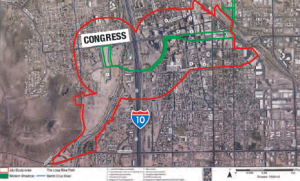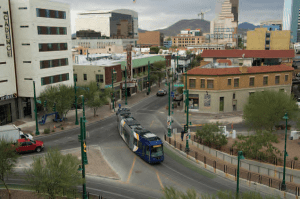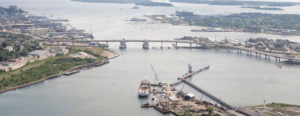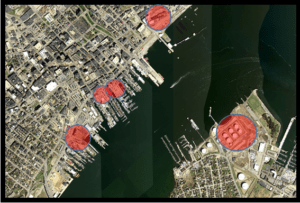Top Story
The Advisory Services Times-Dispatch is the on-line newsletter for ULI’s premier outreach program. Established in 1947, the Advisory Services program has conducted over 650 panels around the world.
This installment of the ULI Advisory Services newsletter includes links to the latest series of past panels and upcoming panels this summer; an overview of two recently completed panels in Tucson, Arizona and Portland, Maine; and a spotlight on Richard Reynolds—long-time ULI member and governor with the ULI Foundation.
As always, if you have any comments or suggestions as to how we can improve this newsletter, please email me.
Thanks,
Tom Eitler, Vice President
ULI Advisory Services
Spotlight: Richard Reynolds
The spotlight for this newsletter is on Richard Reynolds, long-time ULI member from Boston Massachusetts.
 Reynolds has been active in the Urban Land Institute for almost 30 years, and is a Governor of the ULI Foundation. He has served as Chair of several flights of the Office and Industrial Parks Council, Vice Chair of the Office Development Council, and as a member of the Public/Private Partnership Council. He also served as Chair of the Boston District Council of ULI. He has participated in or chaired seven Advisory Service Panels across the country, including the most recent Governors Advisory Panel In May of 2013 Reynolds resumed his role as President of The Reynolds Group, Inc, a strategic real estate consulting firm founded in 2004.
Reynolds has been active in the Urban Land Institute for almost 30 years, and is a Governor of the ULI Foundation. He has served as Chair of several flights of the Office and Industrial Parks Council, Vice Chair of the Office Development Council, and as a member of the Public/Private Partnership Council. He also served as Chair of the Boston District Council of ULI. He has participated in or chaired seven Advisory Service Panels across the country, including the most recent Governors Advisory Panel In May of 2013 Reynolds resumed his role as President of The Reynolds Group, Inc, a strategic real estate consulting firm founded in 2004.
Reynolds says “The ULI Advisory Services Panel program is my favorite part of ULI. The opportunity to come together with a small group of talented ULI members, work extremely hard to understand the problem or project, and then provide value added for the sponsor is a wonderful experience. I’ve made great friends serving on panels; the high intensity in a very short time period only adds to the camaraderie. And we often discover when we arrive on site that there is a “twist” to what the panel’s real scope of work should be that adds to the fun and excitement. I encourage every ULI member to offer his or her time to serve on a Panel…you won’t be disappointed.”
Reynolds, an alumnus of Tufts and longtime member of the University’s real estate advisory committee, returned to campus as Vice President of Operations in January 2010 for an interim role that extended for almost three years. His responsibilities included facilities management of 4.9 million SF on 3 campuses, construction, planning, public and environmental health and safety, and dining services.
Between 1993 and 2004 Reynolds was a Principal with Spaulding and Slye, LLC serving in a number of roles with the company, including Managing Director of the Capital Markets Group transacting over $1 billion of investment sales annually and Major Transaction Principal including joint venture developments, major tenant representation assignments, various corporate relocation analyses, and client relationship management. Reynolds also acted as lead Principal for the acquisitions of over $300 million of properties for Windsor Realty Fund II, a joint venture with the DuPont Company and General Investment and Development.
Reynolds received his undergraduate degree from Tufts University in 1967 with a Bachelor of Arts in Economics and his graduate degree was completed in 1970 at Babson College where he received a Masters of Business Administration with high distinction.
“Dick has been one of our most active Governors in the new GAP program,” says Tom Eitler, vice president of ULI Advisory Services. “Reynolds chaired both the Vancouver and Nashville GAPs and he was part of the team ULI put together for the ‘After Sandy’ response panel”. “His knowledge of real estate and land use from both the private and institutional point of view has been tremendously useful in the panel process.” Eitler said.
Panel in focus: Downtown Tuscon, Arizona
Working Together to Revitalize Downtown
In November, the City of Tucson (lead agency), Rio Nuevo, Holualoa Companies, Pima Association of Governments, Pima County, Visit Tucson, and Tucson Electric Power, invited ULI to evaluate the potential downtown opportunity sites adjacent to the new streetcar line set to completed in summer 2014.
The panel’s effort involved evaluating the following issues, among others: how to create and interesting, walkable, transit-oriented downtown with high-quality development and public space; how to encourage the appropriate balance of new housing and related services by identifying appropriate types, mix, location for retails, hotels and attractions; and identifying development opportunities to promote streetcar ridership while strengthening the unique historic neighborhoods nearby.
The panel was chaired by John Walsh, President of TIG Real Estate Services, Inc. The other members of the panel included: Michael Berne of MJB Consulting, Alan Billingsley of Billingsley Investments, Peter Hasselman, Charles Johnson of C.H. Johnson Consulting, Inc., Jan Minami of AMI Concepts and Ross Tilghman of the Tilghman Group
Surrounded by mountains In the Sonoran is Tucson– a city in Pima County boasting a rich cultural heritage– Native American, Spanish and Mexican populations that give the city it’s unique vibrancy and diversity. According to the 2010 U.S. Census, the population of Tucson’s metropolitan statistical area (MSA) is 980,263. The study area’s population, however, is about 42,000— lower than most downtowns in similarly sized metropolitan regions.
The panel’s study area was a a 500 acre site bisected by Interstate 10, and includes many historic, cultural, and civic assets. The central area of downtown encompasses the Congress Street entertainment district, multiple museum and performing arts facilities, and the government and Convention Center complexes. West of the interstate is Tucson’s historic and cultural birthplace and the site of the Mercado District.
The panel made two overarching recommendations: (a) public leadership, community outreach, and transparency are essential, especially given the people of Tucson’s skepticism about government and urban development, and (b) because of market and economic realities, a small-scale, incremental development strategy should be implemented instead of a big-bang approach.
Public Leadership, Community Outreach, and Transparency
The panel agreed that downtown revitalization will occur only if the city leads a diverse group of stakeholders, unites various ward interests, and works with the county and Rio Nuevo to move forward as one community, brought together by a shared love of place. The city needs to demonstrate a renewed sense of service to its citizens and foster bipartisan action between the city and the county. Toward those ends, the panel recommends that the city take the following steps:
- Create an advisory committee composed of diverse stakeholders who will work with local governments and report back to their constituents;
- Work with a revamped Rio Nuevo at the city, county, and metro levels to extend its life and focus its role;
- Appoint a citizen ombudsman to safeguard transparency;
- Develop and implement an information technology master plan to aid transparency and efficiency for the government and public’s good; and
- Provide professional development training to public officials and initiate leadership training programs in high schools and colleges.
Small-Scale Development Focus
Instead of spending resources trying to attract big, splashy developments, Tucson should create a smaller, more incremental and locally based strategy focused on modest projects and improvements. What has been successful thus far in Tucson is not one big retail development but rather a number of smaller concepts that together aggregate to something significant. With that in mind, the panel recommends the city take the following steps:
- Focus on market-rate multifamily rentals near the Congress Street entertainment district;
- Encourage a new business-quality downtown hotel;
- Retain private management of the TCC, reconfiguring its event calendar and making modest improvements to the facility;
- Undertake an analysis of the city’s transit use; and
- Activate the stravenue (portmanteau word created from street and avenue)—a type of road particular to Tucson, running diagonally between and intersecting a street and an avenue—and redevelop a portion of La Placita.
The panel’s final report can be viewed here.
Panel in focus: Portland, Maine (Resilience Panel)
The Kresge Foundation has awarded ULI an $800,000 grant to support its pursuit of urban design and practices that promote development that is more resilient and adaptable to the impact of climate change.
As part of the Kresge program of work ULI will be conducting advisory service panels to address long-range resilience-related challenges and vulnerabilities to weather and sea-level changes. The hope is that the results of such panels can be applied to other communities with similar vulnerabilities.
In May 2014, the cities of Portland and South Portland Maine were the sponsors for the
first ULI Resilience Panel. Portland and South Portland, with a combined population of 92,000 is the largest urban concentration in the state. In addition to the tourism associated with the coast of Maine, the Portland waterfront is the center for the commercial ground fishing industry, lobstering and ferry transportation. It’s also the state’s largest container port with a direct connection to Northern European ports. The working waterfront is one of the primary draws for tourists. South Portland has one of the largest trans-shipment points for fuels and crude oil.
Chaired by panel veteran James DeFrancia, the panel included the following ULI members:
Stephen Antupit of CityWorks, Inc., Dennis Carlberg, Sustainability Director with Boston University, Cori Packard with NYU Schack Institute of Real Estate, Jessica Pavone, Senior Director for Long Term Recovery with New York State’s Red Cross, Byron Stigge of Level Infrastructure, Richard Ward of Ward Development Counsel, LLC and Jeana Wiser with the National Trust for Historic Preservation
The challenge presented to the advisory panel is how cities plan for future sea-level rise and extreme storm events while protecting their base industries.
Based on the assignment, the panel has made a series of recommendations that are summarized here:
- Understand the Local Economy. The panel recommended that the cities both undertake a better understanding the local economy and determine how that economy can be better diversified. The panel suggested focusing on sectors other than fishing and tourism including medical, technology, higher education and arts & culture. The panel also recommended that there be a focus on providing resilient infrastructure and that protection of this critical infrastructure could be achieved through incremental changes.
- Understand the Risks. The panel recommended creating a Comprehensive Risk Assessment that studies the broader indirect and macro-economic impacts from increased storm frequency and sea level rise and developing a process to regularly perform a risk assessment for all city-managed infrastructure assets. The panel also recommended integrating the results and conclusions from Risk Assessment into all aspects of the Comprehensive Planning process and using these results to create programs to inform residents and businesses on the importance of flooding.
- Planning and Development Strategies. The panel recommended that planning and development strategies be focused on storm surge mitigation, land use protection, street network improvements, parking management, storm water management, historic preservation and utilities improvements. To allow economic activity to continue, the panel also suggested a variety of adaptive strategies like wet floodproofing, dry floodproofing, elevating on fill, elevating on piers, site protection, floating structures and amphibious structures as a means to allow both cities to continue to build and adapt on their waterfronts.
- Examples of Adaptive Construction Techniques. The panel provided the cities with a series of example locations on which the menu of adaptive construction techniques could be provided. Specific consideration was given to the Mill Creek Peninsula where a concentration of critical utilities is located.
- Leadership & Governance. The panel recommended creation of two specific entities: the Climate Risk Data Group and the Resilience Working Group as a means to collect, monitor and evaluate climate change information and how best to implement measures to mitigate for the results of these changes.
The panel’s presentation can be viewed here.
Recently Completed:
ULI Advisory Services recently completed panels in the following locations:
- Tucson, Arizona
- Atlantic City, New Jersey
- Pittsburgh, Pennsylvania
- Raleigh-Durham Airport, North Carolina
- Seattle, Washington
- North End – Charlotte, North Carolina
- Garfield Corridor, Chicago, Illinois
- Vancouver, British Columbia
- Portland, Maine — Resilience Panel
Coming Up:
ULI Advisory Services will soon visit the following locations:
- Clearwater, Florida
- Northern Colorado (Estes Park, Loveland, & Fort Collins) — Resilience Panel




